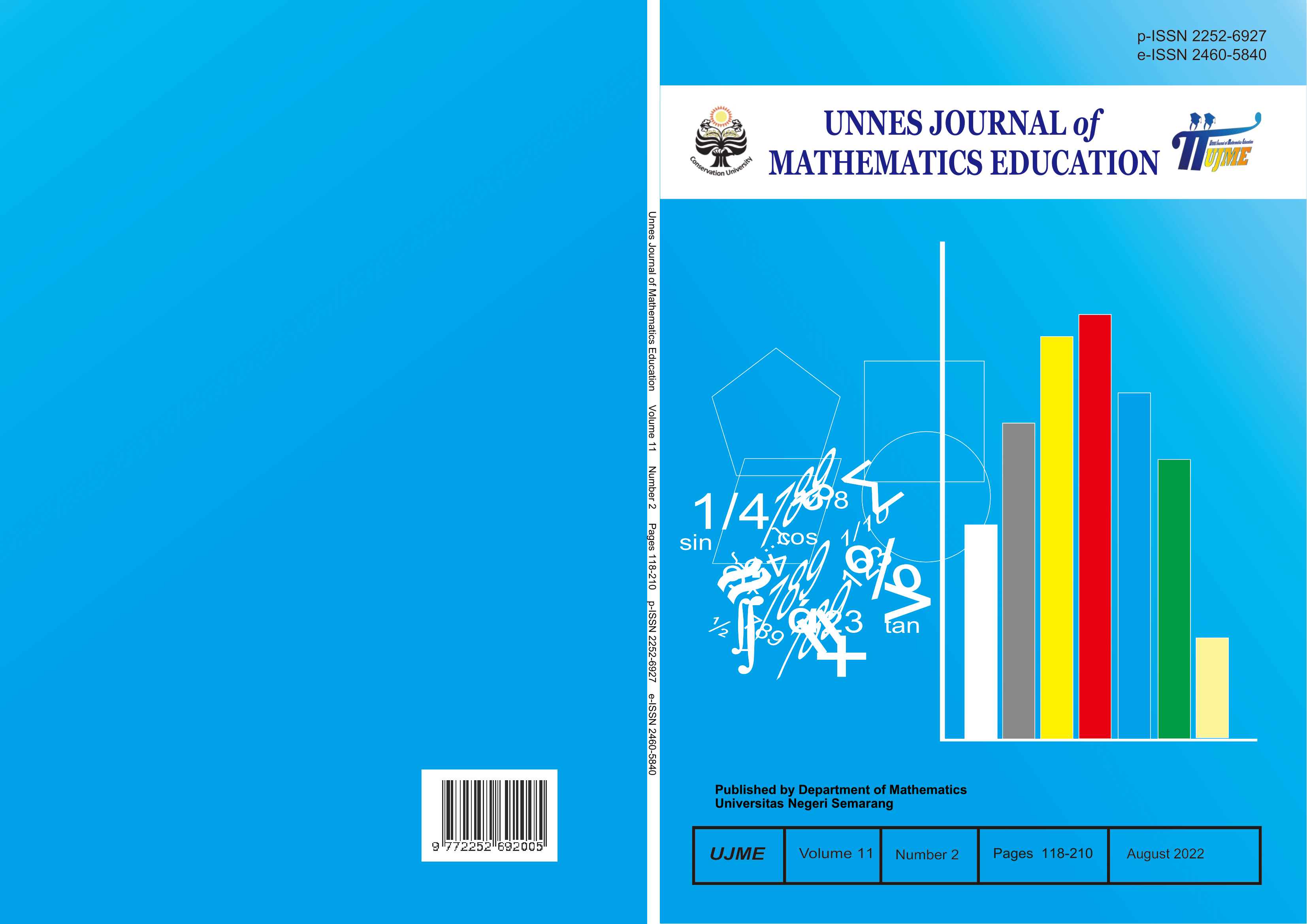Application of Socrative-Based Assessment to Measure Mathematical Creative Thinking Ability with Problem Based Learning Model Viewed from Curiosity
##plugins.themes.academic_pro.article.main##
Abstract
The study aims to (1) test whether the Problem Based Learning model with the application of Socrative-based assessment was effective for measuring students' mathematical creative thinking abilities and (2) describe mathematical creative thinking ability in terms of curiosity in Problem Based Learning model with the application of Socrative-based assessments. The research was included in the mix-method with a sequential explanatory design. The results showed that (1) Problem Based Learning with the application of Socrative assessment was said to be effective for measuring students' mathematical creative thinking abilities; (2) a description of students' mathematical creative thinking ability in terms of curiosity, it was found that students with a high level of curiosity were able to meet the indicators of creative thinking ability elaboration, originality, fluency, and flexibility and were able to explain how to solve smoothly with logical reasons, and students with a medium level of curiosity meeting the indicators of creative thinking ability of elaboration, fluency, and flexibility and being able to explain how to solve it smoothly with logical reasons, and students with a low level of curiosity fulfilling the indicators of creative thinking ability of elaboration and fluency and less able to explain how to solve it smoothly with logical reasons.
##plugins.themes.academic_pro.article.details##
References
Arum, M. P., & Kartono. (2020). Keefektifan Constructive Feedback dalam Pembelajaran Problem Based Learning pada Pencapaian Kemampuan Berpikir Kreatif Matematis dan Rasa Ingin Tahu Siswa. Skripsi. Semarang: FMIPA Universitas Negeri Semarang.
Boss, S. Larmer, J., & Mergendoller, J. (2013). PBL for 21st century success: teaching critical thinking, collaboration, communication, and creativity. Buck Institute for Education 18 Commercial Boulevard, Novato, California 94949 USA. ISBN: 978-0-9740343-6-2 (print)
Farihah, M., & Kartono. (2021). Penerapan Immediate Feedback dalm Pembelajaran PBL daring pada Peningkatan Kemampuan Berpikir Kreatif Siswa Kelas VIII Ditinjau dari Intelligence Quotient (IQ). Skripsi. Semarang: FMIPA Universitas Negeri Semarang.
Istianah, E. (2013). Meningkatkan Kemampuan Berpikir Kritis dan Kreatif Matematik dengan Pendekatan Model Eliciting Activities (MEAS) pada Siswa SMA. Infinity Journal, 2(1), 43.
Kivunja, C. (2015). Teaching students to learn and to work well with 21st century ability: unpacking the career and life ability domain of the new learning paradigm. International Journal of Higher Education 4(1). http://dx.doi.org/10.5430/ijhe.v4n1p1
Lestari, E. K., & Yudhanegara, R. M. (2015). Penelitian Pendidikan Matematika. Bandung: Refika Aditama.
Ma’muroh, H. (2014). Pembuatan Instrumen Evaluasi Pembelajaran IPA Terpadu Berbasis ICT Untuk Mengukur Kompetensi Siswa SMP Kelas VIII. Pillar of Physics Education, 3(1).
Mardhiyana, D., & Sejati, E. O. W. (2016). Mengembangkan Kemampuan Berpikir Kreatif dan Rasa Ingin Tahu Melalui Model Pembelajaran Berbasis Masalah. In PRISMA, Prosiding Seminar Nasional Matematika, 672-688.
Maryati, I. (2018). Penerapan Model Pembelajaean Berbasis Masalah pada Materi Pola Bilangan Di Kelas VII Sekolah Menengah Pertama. Mosharafa: Jurnal Pendidikan Matematika, 7(1): 63-74.
Masrukan & Mufidah, N. A. (2017). Geometry Problem Solving Ability and Tolerance Character of Students 8th Grade with Assessment Project. Journal of Physics: Conference Series, 824. https://doi:10.1088/1742-6596/824/1/012046
Masrukan. (2017). Asesmen Otentik Pembelajaran Matematika. Semarang: FMIPA Universitas Negeri Semarang.
Noprianti, E., & Utami, L. (2017). Penggunaan Two-Tier Multiple Choice Diagnostic Test Disertai CRI Untuk Menganalisis Miskonsepsi Siswa. Jurnal Tadris Kimiya, 2(2), 124.
OECD. (2015). PISA 2015: PISA Results in Focus. Retrivied from https://www.oecd.org/pisa/-2015-results-in-focus.pdf
Undang-undang No. 20 Tahun 2003 tentang Sistem Pendidikan Nasional (Act of The Republic of Indonesia Number 20, 2003).
Rahman, A. (2015). Analisis Pemahaman Guru Tentang Asesmen Pembelajaran Matematika Tingkat SMP Negeri dan Swasta Di Kabupaten Maros. Jurnal Penelitian Pendidikan Insani, 18(2): 5.
Shoit, A., & Masrukan. (2021). Kemampuan Berpikir Kreatif Siswa Ditinjau dari Rasa Ingin Tahu pada Pembelajaran Problem Posing Berbasis Open Ended Problem dengan Performance Assessment. In PRISMA, Prosiding Seminar Nasional Matematika, 4, 37-48.
Sugiyono. (2018). Metode Penelitian Kuantitatif, Kualitatif dan R&D. Bandung: PT Alfabet.
Suhara, A., M., Permana, I., & Firmansyah, D. (2019). Penerapan E-Learning Socrative dalam Pembelajaran Bahasa. Semantik, 8 (2): 10-16.
Sulistiani, E., Waluya, S., B., & Masrukan. (2018). The Analysis of student’s critical thinking ability on discovery learning by using hand on activity based on curiosity. Journal of Physics: Conference Series, 983. https://doi.org/10.1088/1742-6596/983/1/012134
Susiaty, U. D., Prihatin, I., & Hartono, H. (2021). Developing and Playing Geometric Puzzle Game to Enhance the Ability of Mathematical Creative Thinking. KREANO, Jurnal Matematika Kreatif-Inovatif, 12(1), 39-50.
Widiastuti, Y., & Putri, R. I. I. (2018). Kemampuan Berpikir Kreatif Siswa pada Pembelajaran Operasi Pecahan Menggunakan Pendekatan Open-Ended. Jurnal Pendidikan Matematika, 12(2), 13-22.
Wulan, A. R., Isnaeni, A., & Solihat, R. (2018). Penggunaan Asesmen Elektronik berbasis Edmodo sebagai Assesment for Learning Keteampilan Abad 21. Indonesian Journal of Educational Assessment, 2 (1), 1-10.
Yang, K. T., Wang, T. H., & Chiu, M. H. (2015). Study The Effectiveness Of Technology-Enhanced Interactive Teaching Environment On Student Learning Of Junior High School Biology. Eurasia Journal of Mathematics Science & Technology Education, 11(2), 263-275.
Zakiah, N. E., Fatimah, A. T., & Sunaryo, Y. (2020). Implementasi project-based learning untuk mengeksplorasi kreativitas dan kemampuan berpikir kreatif matematis mahasiswa. Teorema: Teori dan Riset Matematika, 5(2), 285–293.
